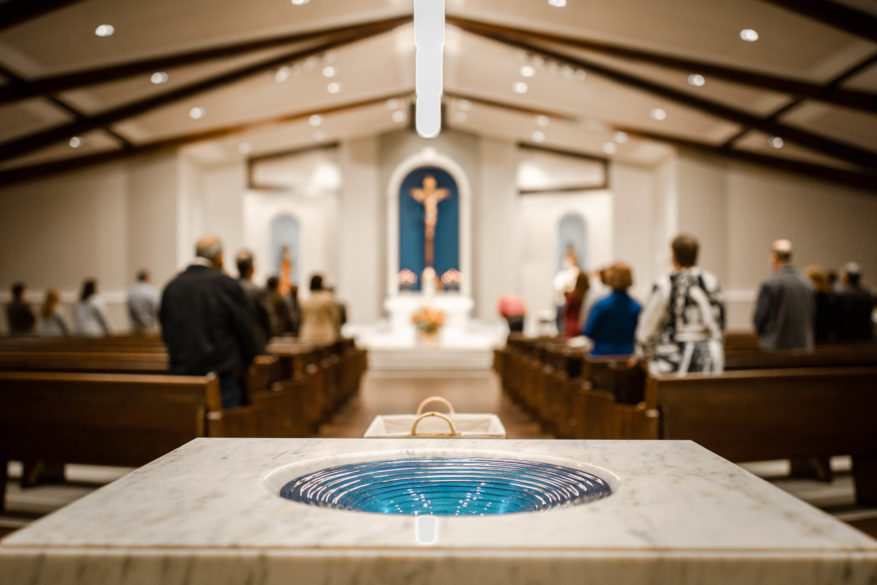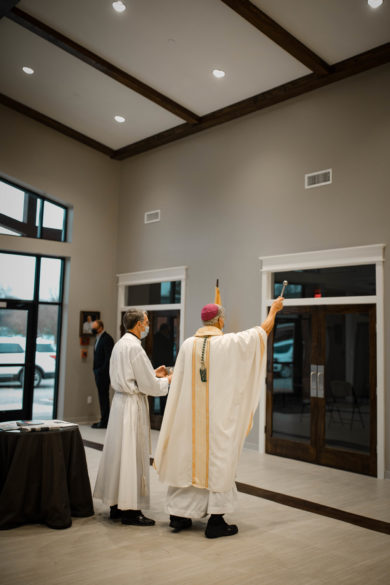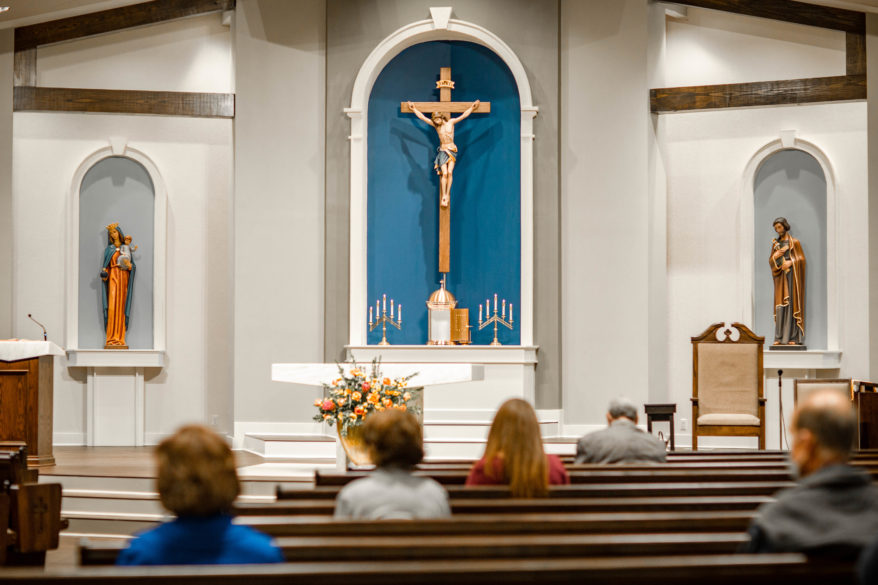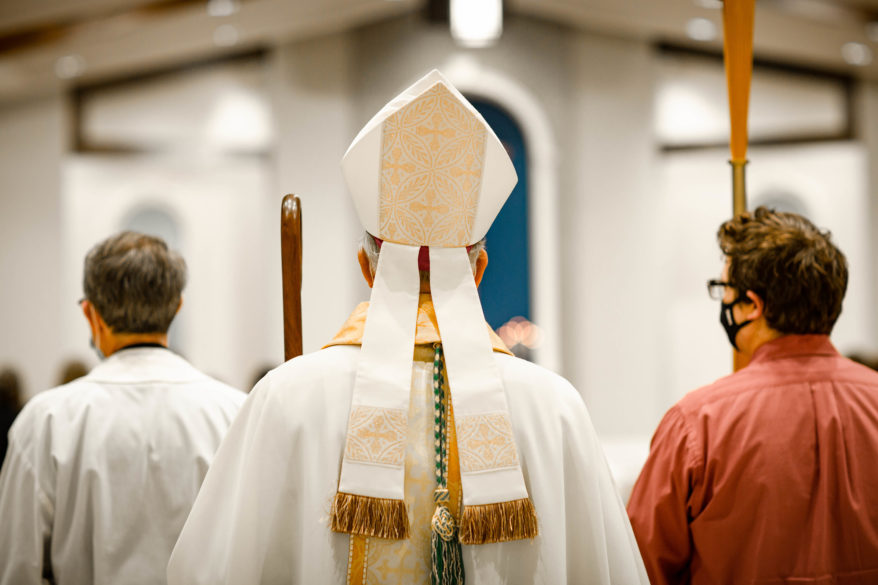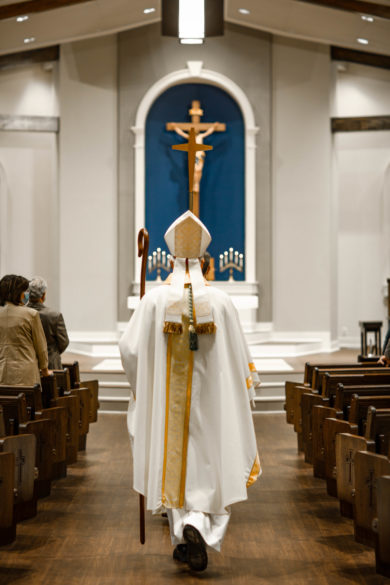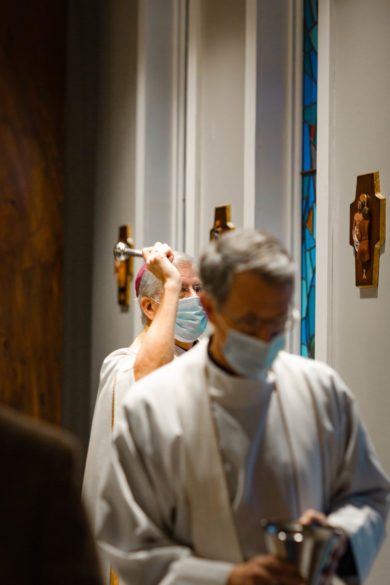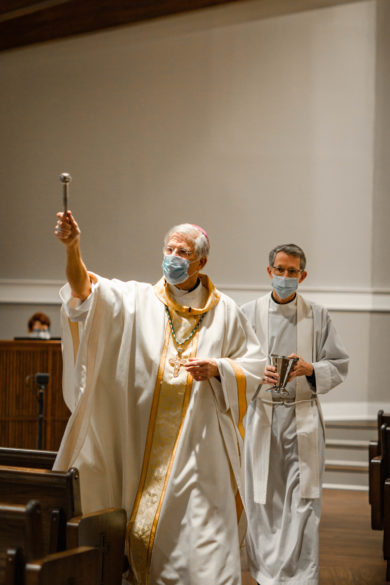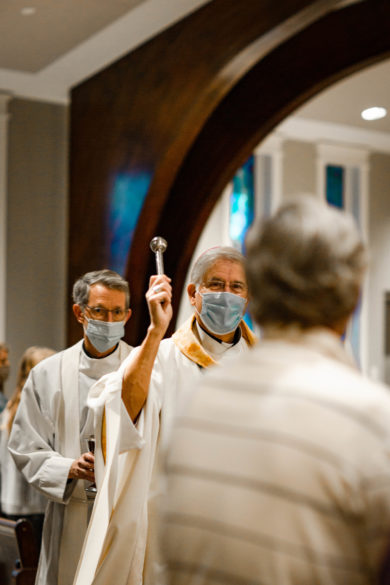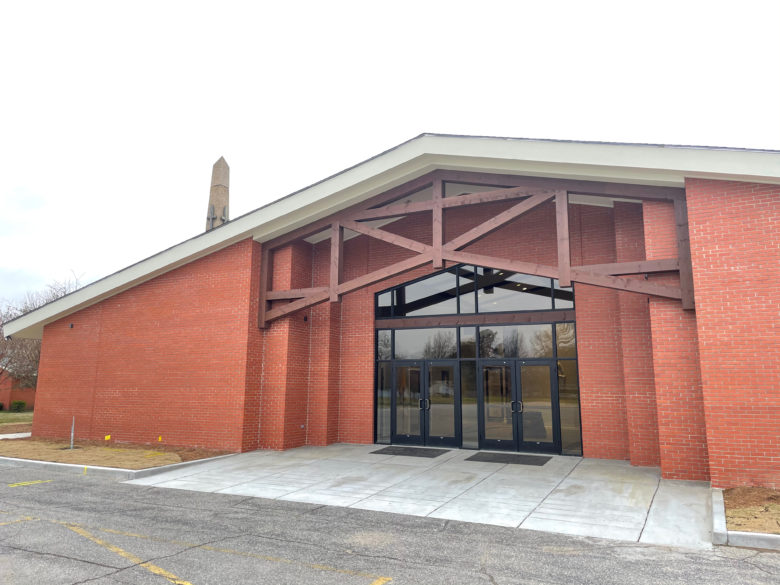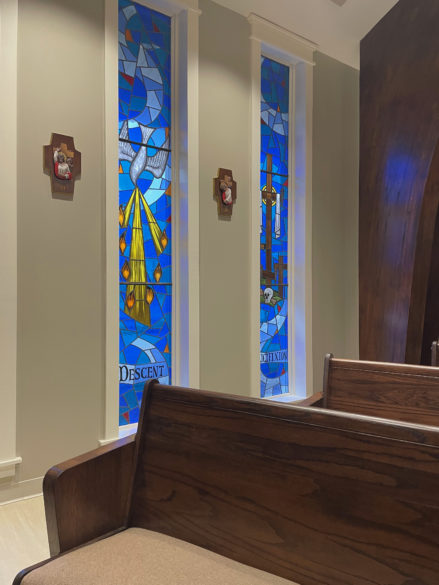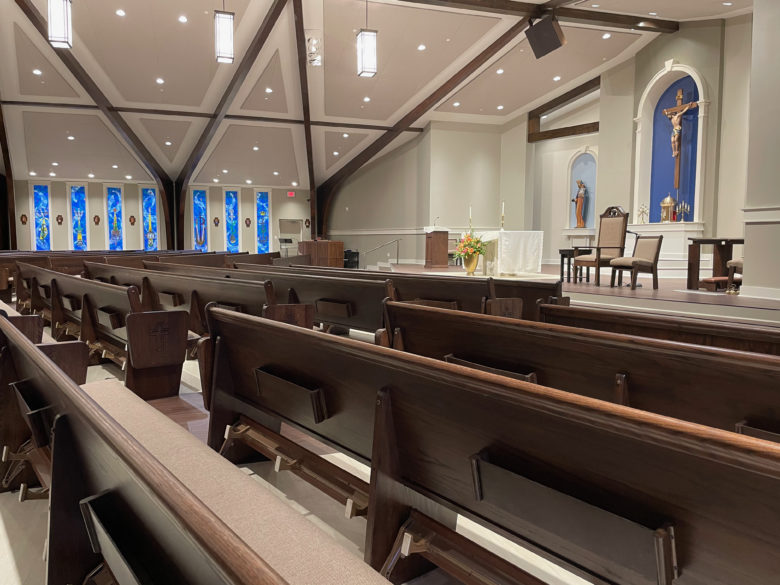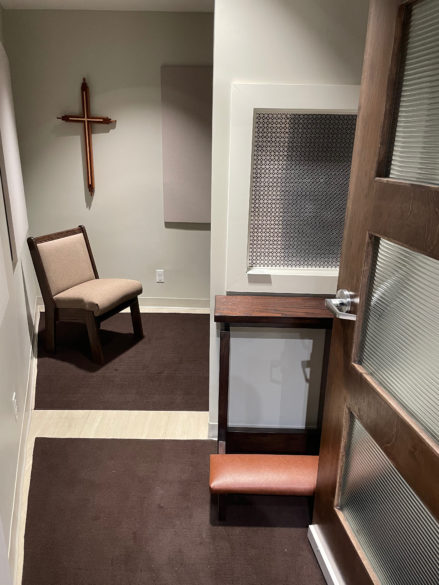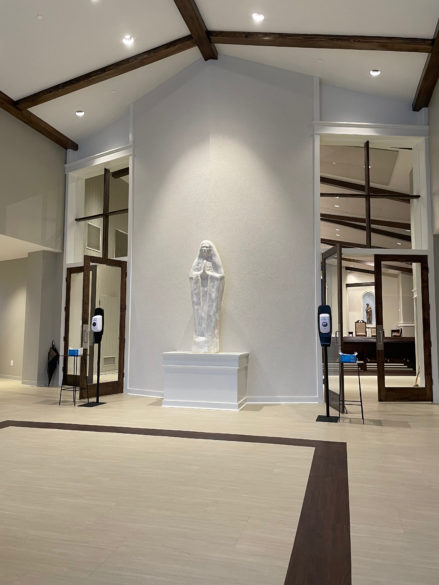Snow day fun


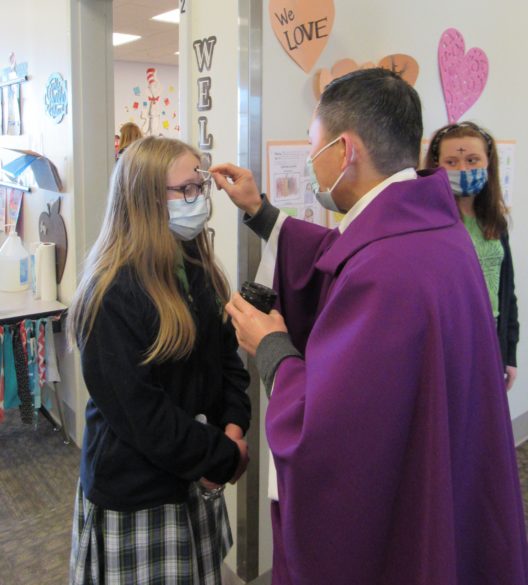
Chapel time at Sacred Heart
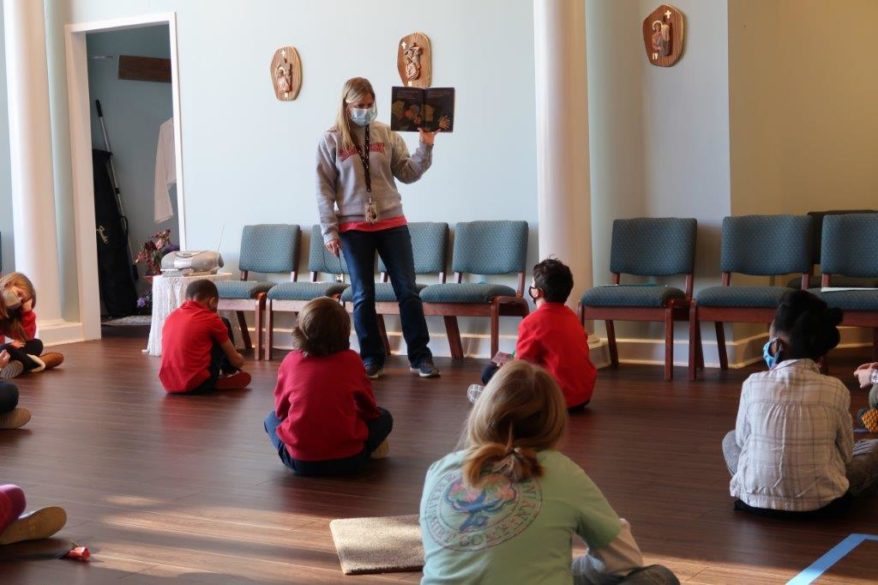
Catholic Schools Week Service Project


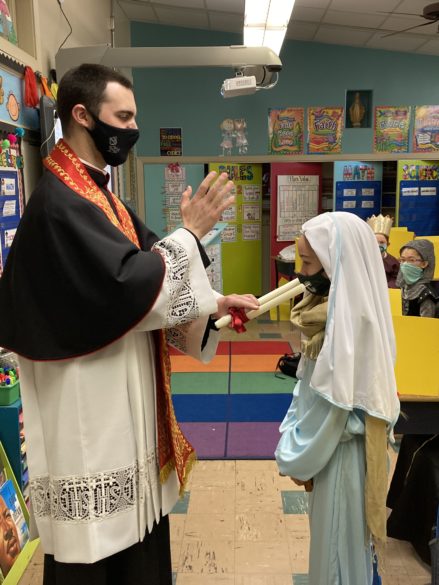









By Mary Woodward
JACKSON – As part of the Deferred Prosecution Agreement (DPA), the Diocese of Jackson has entered with the Federal Government, a Compliance Board has been established to guide the diocese through next August. The Board consists of financial and legal experts along with pastoral and diocesan curia consisting of Rev. Lincoln Dall, vicar general, Carolyn Callahan, diocesan finance officer, and Mary Woodward, diocesan chancellor.
The board, which will gather quarterly, met for its initial meeting on Oct. 13, 2020, to discuss ideas and ways to move forward in implementing the steps listed in the DPA to ensure greater transparency and better communication between the diocese and parishes.
The second meeting of the Board was Jan. 12. The following items were addressed for follow up and implementation:
Improved Communication with parishes – The Flocknote communication system is being implemented in parishes. This is an email and text system that allows the diocese to communicate directly and expeditiously with parish leadership and parishioners. Parishes also can communicate to their parishioners through Flocknote with bulletins, notification of events, Mass reservations during the pandemic, etc.
Lighthouse Hotline – Complaints through this system (see sidebar for more information) may be made anonymously by individuals who have witnessed violations of financial policies and/or ethical conduct by church personnel, including parish or diocesan staff and clergy. For each complaint there are three site administrators who receive notification of that complaint. If one of these site administrators is mentioned in a complaint, the complaint goes to other two administrators.
The board asked that the diocesan Ethical Conduct Review Board, which was established by Bishop Joseph Kopacz in July 2019 to address abuse of vulnerable adults by church personnel, add a member with a finance background. The Board then asked that members of the Ethical Review Board serve as administrators on the Lighthouse System so they can receive all reports made in the system.
The board further recommended the Ethical Review Board develop protocols for consistent handling of reports made to Lighthouse that would encompass response, investigations, and actions. The Ethical Review Board will be meeting in mid-March to develop these protocols for implementation with Lighthouse. The protocols will be presented at the next Compliance Board meeting on April 20.
Annual Audit – The Board was given draft copies of the annual diocesan finance audit ending fiscal year June 30, 2020. The final copy is now posted on the diocesan web site at: https://jacksondiocese.org/offices/administration-finance/
The diocesan department of Temporal Affairs is developing training sessions for parish leadership, including pastors, bookkeepers, finance councils and pastoral councils to educate these entities in best practices and sound policy regarding stewardship of parishioners’ donations.
The Compliance Board will continue to collaborate with and make solid recommendations to the diocese for several more months. These meetings have been beneficial to the ongoing improvements and adjustments in diocesan structures and policies.
By Charlene Bearden
JACKSON – Traditionally, the Diocese celebrates the anniversaries of married couples with a Mass celebrated by Bishop Joseph Kopacz, and a reception on the second Sunday of February at the Cathedral of Saint Peter the Apostle. Due to the COVID-19 pandemic in 2020, the annual diocesan World Marriage Day 2021 celebration was cancelled. The diocese hopes to resume the annual celebration in 2022.
According to World Marriage Day history, the idea of celebrating marriage began in Baton Rouge, Louisiana, in 1981 (40 years ago), when couples encouraged the Mayor, the Governor and the Bishop to proclaim St. Valentine’s Day as “We Believe in Marriage Day.” The event was so successful, the idea was presented to and was adopted by Worldwide Marriage Encounter’s National Leadership.
By 1982, 43 Governors officially proclaimed the day, and celebrations spread to U.S. military bases in several foreign countries. In 1983, the name was changed to “World Marriage Day,” designated to be celebrated each year in February. In 1993, his Holiness, Saint Pope John Paul the II imparted his Apostolic Blessings on World Marriage Day. World Marriage Day celebrations continue to grow and spread to more countries and faith expressions every year.
To honor couples in 2021, the Diocese of Jackson on behalf of the Office of Family Ministry asked parishes to submit the names of couples celebrating their 60th, 50th, 25th or any significant anniversary to the Office of Family Ministry, 82 couples from throughout our diocese submitted their names.
Additionally, each couple will receive by mail at a future date, an anniversary certificate that has been blessed and signed by Bishop Kopacz.
Please join us in celebrating the anniversaries of the following couples:
60 Years
Marie and Irvin Baugh, St. Joseph, Greenville
Dorothy and James Bright, St. Mary Basilica, Natchez
Renate and Sario Caravalho, St. John, Oxford
Marilyn and Ray Hansen, St. Francis, Madison
Carol and Herman Cooper, Holy Savior, Clinton
Iris and Cecil Harrison, St. Richard, Jackson
Shirley and Bert Haydel, St. Alphonsus, McComb
Louise and Duke Mallory, St. Mary Basilica, Natchez
Rose Marie and Joe Portera, St. Joseph, Greenville
Anna and Jerry Roan, St. Jude, Pearl
JoAnne and Tom Zettler. St. Patrick, Meridian
50 Years
Lynne and Raymond Abraham, St. Paul, Vicksburg
Socorro and Charlie Benn, St. Francis, Madison
Rebecca and Tony Bombich, Holy Savior, Clinton
Teresa and Emmett Burns, St. Mary Basilica, Natchez
Maureen and Nicolas Calico, St. Jude, Pearl
Rosie and Bob Conner, St. Patrick, Meridian
Evelyngayle and George Cricenti, St. Francis, Madison
Delanie and Hanson DarDar, St. Alphonsus, McComb
Donna and Lucien Finn, St. Mary Basilica, Natchez
Sheila and Sam Franco, St. John, Oxford
Cheryl and Frank Grove, Holy Savior, Clinton
Linda and Robert Gunther, St. Mary, Iuka
Beth and John Hinkle, St. Joseph, Greenville
Val and Jerry Hosemann, St. Paul, Vicksburg
Joy and Marcel Jojola, St Joseph, Holly Springs
Myra and Pat Kalahar, St. Jude, Pearl
Doris and Jack Kerwin, St. Mary Basilica, Natchez
Pam and Bill Lawhead, St. John, Oxford
Kathy and Johnny Martin, St. John, Oxford
Debbie and Fred Miller, St. Alphonsus, McComb
Jamae and Mike Sellari, Holy Savior, Clinton
Lydia and David Smith, St. John the Baptist, Sardis
Laura and John Valentine, St. John, Oxford
25 Years
Wendy and Alan Blue, St. Alphonsus, McComb
Libby and Chris Callegan, Holy Savior, Clinton
Michelle and Mark Chmielewski, St. Francis, Madison
Sandra and Michael Cirilli, St. Joseph, Greenville
Kelley and Drew Clinton, St. John, Oxford
Joy and Mike Crown, St. Joseph, Greenville
Julie and Stephen Hornaday, St. Francis, Madison
Melodie and Lawrence Deese, St. Mary, Batesville
Schrie and Jack Duthu, St. Joseph, Greenville
Susannah and Wade Heatherly, St. Mary Basilica, Natchez
Michelle and Hayden Kaiser, St. Mary Basilica, Natchez
Christie and Robert Loper, St. Joseph, Greenville
Tara and Kurre Luber, St. John, Oxford
Jennifer and Jerry Myrick, St. Francis, Madison
Christina and David Overton, St. Jude, Pearl
Octavia and Byron Poindexter, Christ the King, Jackson
Connie and Andy Reynolds, St. John, Oxford
Mirna and Alex Robles, St. Mary, Batesville
Ashley and Donald Roesch, St. Paul, Vicksburg
Rachel and Sean Simmons, St. Mary Basilica, Natchez
Delaney and Rob Smith, Holy Savior, Clinton
Beth and Lonnie Stinnett, St. John, Oxford
Paige and Robert Suares, St. Joseph, Greenville
Amy and Brett Tisdale, St. Alphonsus, McComb
Jennifer and Chris Tonos, St. Joseph, Greenville
Heather and Chuck Trost, St. John, Oxford
Katie and Brewer Vaught, St. Joseph, Greenville
VeSheler and Pertis Watts, Christ the King, Jackson
Special Anniversaries
Mary and Alex Balducci, St. John, Oxford, 67 Years
Linda and Joe Boisse, St. John, Oxford, 55 Years
Sierra and Blake Cannon, St. John, Oxford, 10 Years
Carol and James Cooper, St. Francis, Madison
Rosalie and Jack Garner, St. John, Oxford, 55 Years
Debbie and John Gibson, St. Joseph, Gluckstadt, 40 Years
Julia and Tom Graham, St. John, Oxford, 55 Years
Betty and Tom Griffith, St. Patrick, Meridian, 70 Years
Kathleen and Adam Hamilton, St. John, Oxford, 10 Years
Julie and Mike Harkins, Holy Savior, Clinton, 40 Years
Kimmy and Chad Hill, St. John, Oxford, 10 Years
Renee and Robert Hoover, St. John, Oxford, 10 Years
Sallie Ann and Will Inman, St. Francis of Assisi, Madison
Anna and Blake Jeffries, St. John, Oxford, 10 Years
Faye and George Jones, Christ the King, Jackson, 55 Years
Janet and Richard Karsten, St. John, Oxford, 61 Years
Antinette and Fred McFadden, Christ the King, Jackson, 56 Years
Margaret and Dave Moody, St. Francis, Madison
Lacey and Matt Nalker, Holy Savior, Clinton, 30 Years
Carrie and Dennis Ott, St. John, Oxford, 67 Years
Ling and Mathias Romkens, St. John, Oxford, 55 Years
Susan and John Schenk, St. Francis, Madison, 20 Years
Darlene and William Smith, St. Francis, Madison, 63 Years
Vance and Parks Smith, St. John, Oxford, 10 Years
Maria and John Bryant Stewart, Sr., Sacred Heart, Canton 26 years
Ana and Jorge Vidal, St. Francis, Madison, 20 years
Kristen and Jacob Whelan, St. John, Oxford, 10 Years
Selena and Steve Wies, Our Lady of Victories, Cleveland, 30 Years
Sheila and Gary Yeck, St. Joseph, Gluckstadt, 51 years
Requisitos para calificar para DACA
Jóvenes que entraron antes de junio 15 de 2007
Haber nacido después del 15 junio 1981.
Tener menos de 16 cuando entró a Estados Unidos
Tener más de 15 años el día que aplica
Tener menos de 31 años el 15 de junio del 2012.
Necesitan una identificación con foto.
Evidencias de residir en Estados Unidos: Diploma High School
o su equivalencia, registro en escuela o fuerzas armadas.
Tener buena conducta moral, no felonía, DUI o violencia doméstica o haber sido condenados por un crimen grave.
Para solicitudes con Inmigración
Ayuda Gratis: escanea el código QR y llena la encuesta del
Centro de Justicia de Mississippi.
Bajo costo: Caridades Católicas:
(601) 944-1222

Some say the world will end in fire;
– “Fire and Ice” by Robert Frost (American Poet 1874-1963)
Some say in ice.
From what I’ve tasted of desire
I hold with those who favor fire.
But if I had to perish twice,
I think I know enough of hate
To say that for destruction,
Ice is great and will suffice.
By Bishop Joseph R. Kopacz, D.D.
Emerging out of an extraordinary ice storm event we would not disagree with Robert Frost that “for destruction ice is great and will suffice.” We are accustomed to naming hurricanes; can we ascribe a name to the silent merciless grip of ice? Lacking the equipment and materials, most of us in the region were powerless to fight back against the devastation of the storm. This was true city wide and on my neighborhood block.
An eerie silence endured day after day, a silence that is natural on frozen tundra, and in desert environments. The pandemic for nearly a year has restricted; the ice for most of the week prohibited our comings and goings. Those who lost power and/or water suffered doubly, and those who lost their lives payed the ultimate price. In our churches, we went from live streaming in the early stages of the pandemic, to limited congregations in recent memory, and back to live streaming on Ash Wednesday. It’s like the twilight zone. But, is there a way that this weather event can draw us deeper into the Kingdom of God that Jesus proclaimed on the First Sunday of Lent?
He is the Way and the Truth for us who foiled the temptations of the ancient adversary in the desert for forty days. Our season of conversion is now underway and we prayed in last Sunday’s opening oration that “we may grow in understanding of the riches hidden in Christ.”
Back to Frost, who in his poem shifts to the spiritual realm when he links the consuming power of fire with desire burning out of control, and the destructive power of ice with rampant hate. From the Preface of the First Sunday of Lent, the priest proclaimed that Jesus “by overturning all of the snares of the ancient serpent, taught us to cast out the leaven of malice.” This is the destructive hate of a frozen heart and mind, hardened by sin and powerless to move in any direction. But, water is also life-giving, both in the countless ways as we manage our daily activities, and likewise in the realm of the spiritual where we endeavor to follow the Lord faithfully.
In fact, the Perseverance Rover that recently landed on Mars will scour the planet’s surface in the search for traces of water, past or present, as the indicator of life. St. Paul wrote incisively to his congregation in Rome. “We were therefore buried with him through baptism into death in order that, just as Christ was raised from the dead through the glory of the Father, we too may live a new life.” (Romans 6:4)
The waters of Baptism call upon the power of God through faith to give us a new way of seeing, We are not powerless and moribund in the assault of sin and destructive behavior; rather, in the waters of baptism we can be washed clean time and again to see the Lord always beckoning us forward on the path of new life.
Last Sunday’s first reading recalled the events in the time of Noe (Noah) who, quarantined in the arc for more than 40 days, floated upon the waters until they receded. From a floating zoo into the light of day had to be genuine liberation. St. Peter in last Sunday’s second reading reflected upon those whom the arc sheltered from the flood waters. “This prefigures Baptism, which saves you now. It is not a removal of dirt from the body but an appeal to God for a clear conscience through the resurrection of Jesus Christ. (1Pt 3:21)
The first covenant in the Old Testament was an unbreakable bond between God and all of creation, especially humanity, and the rainbow was its forever sign. Throughout Israel’s history the covenant revealed God’s loving faithfulness, (hesed). Abraham and Sarah and their family were given the promise. God formed a people with Moses and the Israelites on Mount Horeb and the Ten Commandments solidified the covenant. The promise came to David that his lineage will never end, and it now comes full circle in the life-giving death and resurrection of the Lord.
The new covenant in his blood is an unbreakable bond that neither fire nor ice, nor a pandemic, are capable of destroying. Through faith and baptism we belong to Jesus Christ and may this Lent be a time when we turn away from sin and embrace the gospel of forgiveness and reconciliation with renewed faith, hope and love.
Por Obispo Joseph R. Kopacz, D.D.
Algunos dicen que el mundo terminará en fuego;
– “Fire and Ice” (Hielo y Fuego) de Robert Frost (poeta estadounidense 1874-1963)
Algunos dicen en hielo.
Por lo que he probado de deseo
Sostengo con los que favorecen el fuego.
Pero si tuviera que morir dos veces
Creo que sé lo suficiente sobre el odio
Para decir eso por destrucción
El hielo es genial y será suficiente.
Al salir de una tormenta de hielo extraordinaria, no estaríamos en desacuerdo con Robert Frost en que “para la destrucción, el hielo es genial y será suficiente”. Estamos acostumbrados a nombrar a los huracanes; ¿Podemos atribuir un nombre al silencioso y despiadado agarre del hielo? Al carecer del equipo y los materiales, la mayoría de nosotros en la región fuimos impotentes para luchar contra la devastación de la tormenta. Esto fue cierto en toda la ciudad y en la cuadra de mi vecindario.
Un silencio inquietante soportado día tras día, un silencio que es natural en la tundra helada y en los entornos desérticos. La pandemia nos ha restringido durante casi un año; el hielo, durante la mayor parte de la semana, prohibió nuestras idas y venidas. Aquellos que perdieron la energía y / o el agua sufrieron el doble, y los que perdieron la vida pagaron el precio más alto. En nuestras iglesias, pasamos de la transmisión en vivo, en las primeras etapas de la pandemia, a congregaciones limitadas, en la reciente memoria y de nuevo a la transmisión en vivo del Miércoles de Ceniza. Es como la zona del crepúsculo.
Pero ¿hay alguna manera en que este evento meteorológico pueda llevarnos más profundamente al Reino de Dios que Jesús proclamó el primer domingo de Cuaresma?
Él es el Camino y la Verdad para nosotros que frustramos las tentaciones del antiguo adversario en el desierto durante cuarenta días. Nuestra temporada de conversión ya está en marcha y oramos en la oración de apertura del domingo pasado para que “podamos crecer en la comprensión de las riquezas escondidas en Cristo”.
Volvamos a Frost, quien en su poema cambia al reino espiritual cuando vincula el poder consumidor del fuego con el deseo quemando fuera de control y el poder destructivo del hielo con un odio desenfrenado. En el prefacio del primer domingo de Cuaresma, el sacerdote proclama que Jesús “al derribar todos los lazos de la serpiente antigua, nos enseñó a echar fuera la levadura de la malicia”. Este es el odio destructivo de un corazón y una mente congelados, endurecidos por el pecado e impotentes para moverse en cualquier dirección. Pero el agua también da vida, tanto en las innumerables formas en que administramos nuestras actividades diarias, como en el ámbito de lo espiritual, en el que nos esforzamos por seguir al Señor fielmente.
De hecho, el Perseverance Rover (Robot Perseverancia) que aterrizó recientemente en Marte recorrerá la superficie del planeta en busca de rastros de agua, pasados o presentes, como indicador de vida. San Pablo escribió incisivamente a su congregación en Roma. “Pues por el bautismo fuimos sepultados con Cristo, y morimos para ser resucitados y vivir una vida nueva, así como Cristo fue resucitado por el glorioso poder del Padre.” (Romanos 6:4)
Las aguas del Bautismo invocan el poder de Dios a través de la fe para darnos una nueva forma de ver. No somos impotentes y moribundos en el asalto del pecado y la conducta destructiva; más bien, en las aguas del bautismo, podemos ser lavados una y otra vez para ver al Señor siempre llamándonos hacia adelante en el camino de la nueva vida.
La primera lectura del domingo pasado recordó los eventos en la época de Noé, quien, en el Arca durante más de 40 días, flotó sobre las aguas hasta que éstas retrocedieron. De un zoológico flotante a la luz del día tuvo que haber una auténtica liberación. San Pedro, en la segunda lectura del domingo pasado, reflexionó sobre aquellos a quienes el Arca protegió de las inundaciones. “Y aquella agua representaba el agua del bautismo, por medio del cual somos ahora salvados. El bautismo no consiste en limpiar el cuerpo, sino en pedirle a Dios una conciencia limpia; y nos salva por la resurrección de Jesucristo. (1Pe 3:21)
El primer pacto en el Antiguo Testamento fue un vínculo inquebrantable entre Dios y toda la creación, especialmente la humanidad, y el arco iris fue su signo para siempre. A lo largo de la historia de Israel, el pacto reveló la fidelidad amorosa de Dios, (hesed). Abraham, Sara y su familia recibieron la promesa. Dios formó un pueblo con Moisés y los israelitas en el monte Horeb y los Diez Mandamientos solidificaron el pacto. David recibió la promesa de que su linaje nunca terminará, y ahora se completa el círculo en la muerte vivificante y la resurrección del Señor.
El nuevo pacto en su sangre es un vínculo inquebrantable que ni el fuego, ni el hielo, ni una pandemia son capaces de destruir. A través de la fe y el bautismo, pertenecemos a Jesucristo, y que esta Cuaresma sea un momento en el que nos alejemos del pecado y abracemos el evangelio del perdón y la reconciliación con fe, esperanza y amor renovados.
By Carol Glatz
VATICAN CITY (CNS) – As Christians pray, fast and give alms during Lent, they also should consider giving a smile and offering a kind word to people feeling alone or frightened because of the coronavirus pandemic, Pope Francis said.
“Love rejoices in seeing others grow. Hence it suffers when others are anguished, lonely, sick, homeless, despised or in need,” the pope wrote in his message for Lent 2021.
The message, released by the Vatican Feb. 12, focuses on Lent as “a time for renewing faith, hope and love” through the traditional practices of prayer, fasting and almsgiving. And, by going to confession.
Throughout the message, Pope Francis emphasized how the Lenten practices not only promote individual conversion, but also should have an impact on others.
“By receiving forgiveness in the sacrament that lies at the heart of our process of conversion, we in turn can spread forgiveness to others,” he said. “Having received forgiveness ourselves, we can offer it through our willingness to enter into attentive dialogue with others and to give comfort to those experiencing sorrow and pain.”
The pope’s message contained several references to his encyclical “Fratelli Tutti, on Fraternity and Social Friendship.”
For example, he prayed that during Lent Catholics would be “increasingly concerned with ‘speaking words of comfort, strength, consolation and encouragement, and not words that demean, sadden, anger or show scorn,’” a quote from the encyclical.
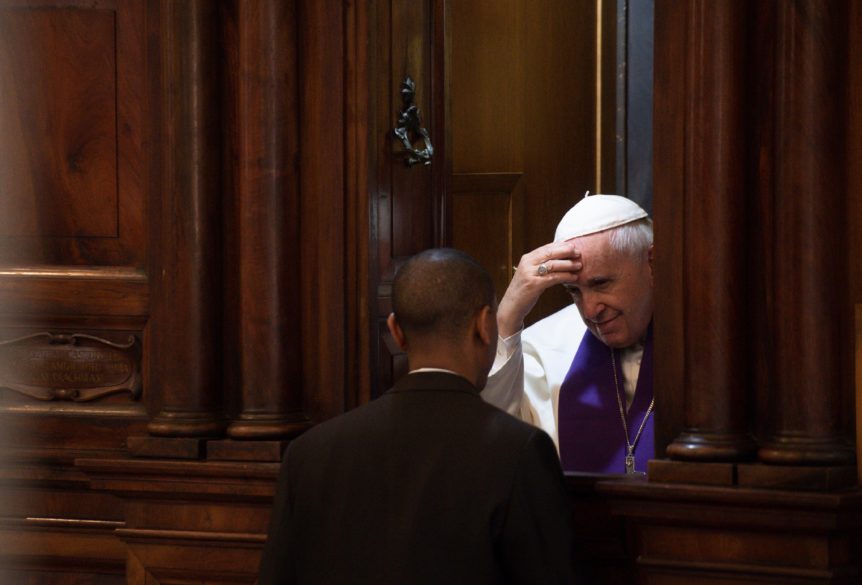
“In order to give hope to others, it is sometimes enough simply to be kind, to be ‘willing to set everything else aside in order to show interest, to give the gift of a smile, to speak a word of encouragement, to listen amid general indifference,’” he said, again quoting the document.
The Lenten practices of fasting, almsgiving and prayer were preached by Jesus and continue to help believers experience and express conversion, the pope wrote.
“The path of poverty and self-denial” through fasting, “concern and loving care for the poor” through almsgiving and “childlike dialogue with the Father” through prayer, he said, “make it possible for us to live lives of sincere faith, living hope and effective charity.”
Pope Francis emphasized the importance of fasting “as a form of self-denial” to rediscover one’s total dependence on God and to open one’s heart to the poor.
“Fasting involves being freed from all that weighs us down – like consumerism or an excess of information, whether true or false – in order to open the doors of our hearts to the one who comes to us, poor in all things, yet full of grace and truth: the son of God our savior.”
Cardinal Peter Turkson, prefect of the Dicastery for Promoting Integral Human Development, presenting the message at a news conference, also insisted on the importance of “fasting and all forms of abstinence,” for example, by giving up “time watching TV so we can go to church, pray or say a rosary. It is only through self-denial that we discipline ourselves to be able to take the gaze off ourselves and to recognize the other, reckon with his needs and thus create access to benefits and goods for people,” ensuring respect for their dignity and rights.
Msgr. Bruno-Marie Duffe, secretary of the dicastery, said that at a time of “anxiety, doubt and sometimes even despair” because of the COVID-19 pandemic, Lent is a time for Christians “to walk the way with Christ toward a new life and a new world, toward a new trust in God and in the future.”
By Father Clement “Clem” Olukunle Oyafemi
JACKSON – Beloved sisters and brothers in Christ, it is my pleasure to introduce myself to you once again. I am deeply grateful to Fran Lavalle and Bishop Joseph Kopacz for inviting me to this diocese. I joined the Office of Intercultural Ministry last October and if not for COVID I would have toured all the parishes of the diocese by now.
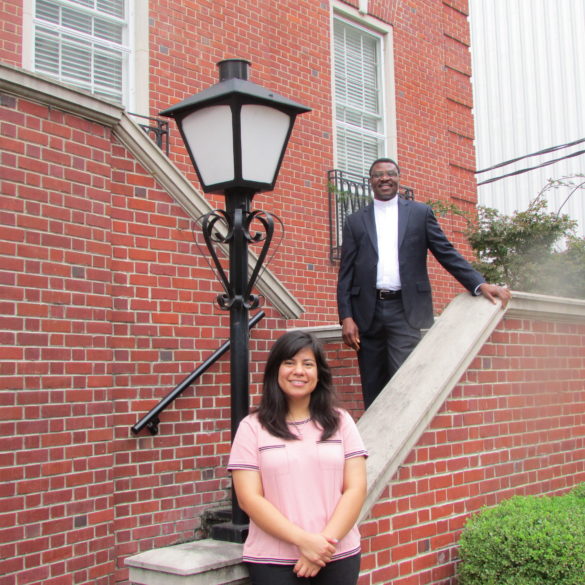
The philosophy behind intercultural ministry is that it is not enough to just know that people from other cultures exist among us; we need to dialogue with them. Interculturalism, therefore, involves moving beyond mere passive acceptance of a many cultures in a community. The beauty lies in the many cultures effectively existing in society to the level of promoting mutual respect and dialogue. I believe that intercultural ministry is a genuine fruit that must grow out of authentic multicultural ministry.
People cannot just exist side by side in the church for several decades without engaging with one another in fruitful and respectful dialogue. Intercultural philosophy/theology challenges the idea of legitimizing segregated communities, leaving them in isolation from each other. Why? Because isolation leads to death. That explains why most of the national churches in our big cities like New York, Chicago, Los Angeles, etc., died out.
From pastoral experience, effective multicultural offices in Catholic dioceses should after some years grow into one intercultural office. That is why the people serving in multicultural offices cannot just be proficient in various human languages but must also be fluent in reading and speaking the language of the heart – love. It is only when we are converted and transformed that we can make ourselves available as instruments of transformation.
Today’s church is not just talking about tolerance or collaboration, but we are talking about being in profoundly genuine communion with God and with one another.
Daisey Martinez is the associate for this office. She is also fluent in Spanish and English and also in the language of the heart – her smile. We are here for everyone. Our plan is to visit every parish to introduce ourselves. That is done right now by invitation for obvious reasons. Some parishes would prefer to see us only when the pandemic is completely over, and we don’t have to mask up like a masquerade ball – LOL. We have a few parishes lined up for the months of February and March.
We hope to also visit schools, (public and private), hospitals, youth groups, and so on, building bridges and encouraging people to see diversity as a gift to be celebrated and not a problem to be solved.
During our visit to parishes, especially for workshops, we will dwell heavily on “Open Wide our Hearts,” a pastoral letter the USCCB published in 2018. We will build on the workshop that Bishop Shelton Fabre of the Diocese of Houma-Thibodaux, presented to the clergy of the Diocese of Jackson in the month of January.
Post COVID, we hope to have a big celebration in which all the different ethnic groups in the diocese will gather with the bishop to celebrate our diversity.
As we begin this Lenten season, let us continue to pray for one another that the true spirit of Repentance may be experienced by all.
(Father Clem Oyafemi is the coordinator for the Office of Intercultural Ministry of the Diocese of Jackson.)
By Mary Margaret Edney
GREENVILLE – As a seminarian, Father Thomas Mullaly wrote a letter to his superior general of the Society of the Divine Word who resides in Rome, detailing where he’d would like to end up as a priest. In the letter, he asked to go south, which is where he’s been ever since.
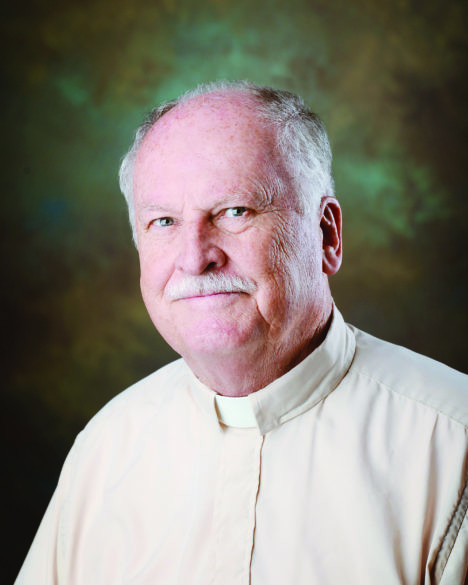
Mullaly, a native of Emmett, Michigan, has retired from administering of parishes after 50 years of service as a Divine Word Missionary priest.
“It went by very fast,” Mullally said with a laugh, reflecting on his decades spent in the priesthood. “If you are open to people, if you are compassionate and merciful, the laity will respond. They enjoy a priest who can laugh and cry with them and minister to them.”
And that’s exactly what Mullally did.
“I’m not a cook, so I ate with a lot of families,” he explained. “One of the great joys I had was sitting down and having a wonderful meal with parishioners. People love to have their priests come to their home and have a meal with them.”
But being a parish priest in the deep south wasn’t originally what Mullally had in mind. While he was a junior in high school, he talked to his guidance counselor about going overseas to work in foreign service. His counselor suggested priesthood, and he imagined he would end up being a missionary in a foreign country after his ordination on Dec. 19 1970, in Techny, Illinois. However, Mullally wasn’t a linguist, and his health at the time wasn’t ideal for international travel, so he decided to stick with the southern United States.
“I was very happy; I definitely made the right decision,” he said, when reflecting back on his decades of priesthood. “I have no complaints, I love my ministry.”
Though his vocation didn’t take him to foreign countries, it did bring foreign countries to him. Since 1996, Mullally has mentored young missionaries of his religious order, the Society of the Divine Word, which pastor in many of Mississippi’s African-American Catholic and multi-cultural churches. From Indonesia, Vietnam, India, Brazil, Ghana and Benin — he’s had the chance to mentor young priests from all over the world.
“I tell them that to learn about the black community or any community, you have to walk in the streets and get to know them,” he said. “To minister, you must visit their homes, visit the sick and listen to their stories.”
From St. Martinville and Jeanerette, Louisiana, to Pine Bluff, Arkansas and finally to Mississippi’s Sacred Heart in Greenville, St. Francis in Shaw and Sacred Heart in Rosedale, Mullally always made it a goal to become entrenched in the local community he serves. By spending quality time with his parishioners outside of Sunday Mass, he really got to know them, and they got to know him.
“I really enjoyed working with the youth, I’d go to basketball and football games,” he said, adding that when he left St. Martinville in 1975, he was given a team letter jacket. “It’s 45 years old, and I still wear it. I wore it yesterday, and I’ll wear it tomorrow.”
Now, as a retired priest, Mullally’s responsibilities have shifted, and he still plans to fill in for priests who need a substitute. But, one thing that won’t change with his retirement is his commitment to knowing his community.
“I always evangelize, especially with young people,” he said. “I just walked recently even though was cold in a park in Greenville, and I talk to group of young teenagers and — ask them how they’re doing, how school is coming along. Even in Kroger, I talk to the young cashiers and asked them if them know where Sacred Heart church is located, and if they do not, I tell them where the church is.”
“It’s been a wonderful experience to know African-American people and understand their side of their side of the story of life,” Mullally said. “The relationships I’ve made are incredible. I’m a missionary, that’s me.”
CLEVELAND – Over seven years ago Our Lady of Victories Church, Cleveland, started having discussions about replacing worn out flooring and refinishing pews. The discussion was broadened to include a vision of the parish’s needs and hopes. This finally resulted in the just completed renovation of and addition to the church, which included re-staining the pews, replacing flooring, redoing all of the wall finishes, installing a new ceiling and lighting system, renewing the stations of the cross, and purchasing a new crucifix, tabernacle, St. Joseph statue, ambo and presider’s chair.
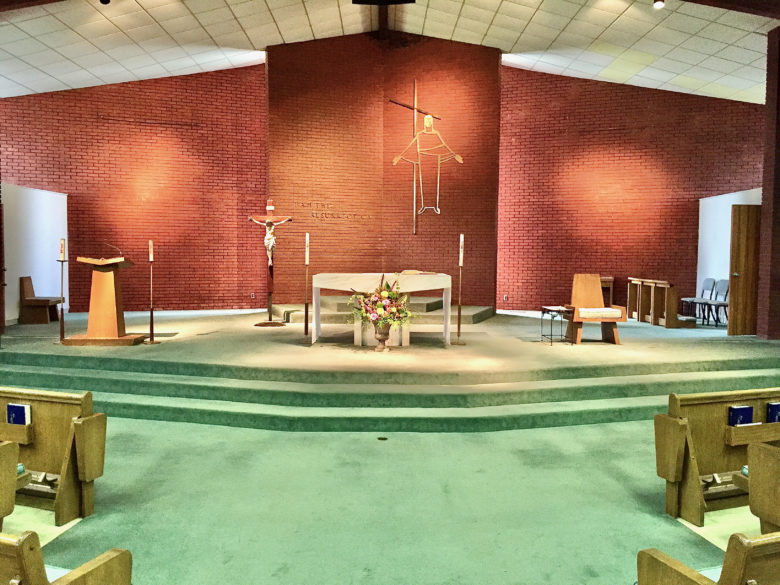
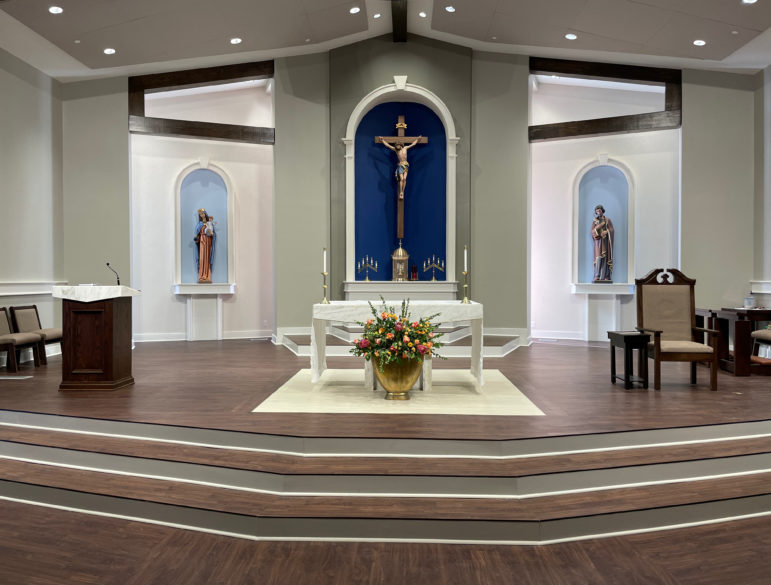
The new addition includes a spacious and welcoming narthex, two multipurpose rooms, and bathrooms. Parishioners have been very pleased with the finished project. It retains what was most liked about the church while giving it an even more sacred and grand yet intimate feeling, along with new space for fellowship.
The project was designed by JH&H Architects of Flowood and constructed by KT Builder of Greenwood. To make this dream possible, many parishioners donated their time, creativity and financial gifts, under the leadership of the OLV Renovation Committee — Brenda Aguzzi, Michael Aguzzi, Frances Janoush, Mary Helen Waller, Gloria Norquist and Ron Koehler.
Bishop Joseph Kopacz blessed the completed renovation and addition on Sunday, Feb. 7.
